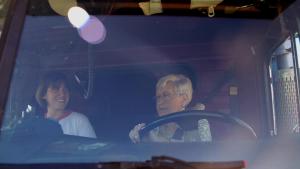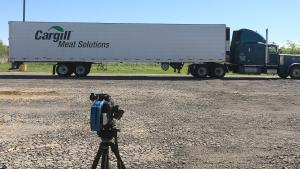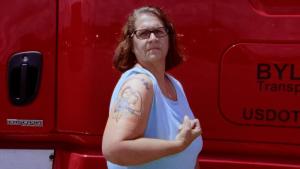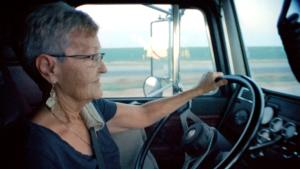Long Haulers
Introduction
From 77 year-old Sandi, to formerly incarcerated Lori, to guinea pig lover Tracy, Long Haulers defies stereotypes and gives a platform to women who have often been marginalized and type-casted. Sharing their sorrows and triumphs, viewers learn who these women are, and what keeps them trucking.
Featured review
Synopsis
Long Haulers is an experimental 16mm and video feature-length documentary about three female truck drivers, Sandi, Lori, and Tracy. The film weaves together the stories of their lives to understand why they started trucking and what keeps them trucking. Riding along with these women, we learn about Lori’s time in prison, Sandi’s wisdom as a 77-year old trucker, and Tracy's experiences working for sexist trucking companies. Through the course of the film we become a passenger, slowly getting to know these women as they navigate across the country. From shiny profiles of women-shaped ornaments to the male-filled diners, Long Haulers provides a window into the world of trucking that reflect the sexism that dominates the industry. Long Haulers aims to provoke audiences to question gender roles and the workplace in trucking and at large.
Mapping the paths of these women’s lives in relation to trucking industry, the film illustrates the reported 5.1% of female drivers in the United States that has continued to expand since the early 2000’s. Understanding the truck not only as a means of income for these women but also as a place of freedom, autonomy, and self-expression, Long Haulers prompts Sandi, Lori, and Tracy to perform with their trucks in order to communicate to audiences the embedded interdependency between truck and woman. From Lori drawing out the physical dimensions of the truck as she talks about her five years in prison, to Tracy caressing her truck like the horses she trained as a child, Long Haulers enables the truck to act as a conduit for these women to share their traumas, fantasies, and dreams.
Reviews
- From "Invisible on the Interstate: Amy Reid's Long Haulers"
Awards and Screenings
Director Commentary
Features and Languages
Film Features
- Closed Captioning







“Trucking is a lifestyle and not a job.” These were the sentiments that Sandi shared when I began driving with her on week-long shoots at the start of Long Haulers. Each woman I met, welcomed me into their sleeper cabins and hearts and shared how trucking has provided paths forward in their lives. The women I rode with have tenacity, courage, and resilience and I believe their stories deserve to be heard. The fact is, everything from the furniture in our house to the food we eat has most likely been transported by a truck driver. Their work makes not only one's personal life easier but makes the United States function. By giving audiences insights into the physical and emotional labor of being a trucker and the added sexism that female truckers face, I want people to look at 18-wheelers differently the next time they're on the road.
In Long Haulers, through 16mm film experimentation, performative play, and direct observational filmmaking I try to represent the life of being a female trucker. Traveling to truck stops, distribution centers, and factories one sees the daily tasks a trucker has to do on a daily basis.
Weaving together the stories of three truckers, Sandi, Lori, and Tracy, Long Haulers shares how each woman started trucking and what keeps them trucking. The women I worked with fled domestic violence, the stigmas of being formerly incarcerated, and mental health issues. Moving between the intimate stories of their lives in tandem with the working conditions of being a trucker, Long Haulers aims to provoke audiences to question stereotypes, sexism, and gender roles not only in trucking, but in the larger workforce of blue collar positions.